- Home
- Nick Hornby
Ten Years in the Tub: A Decade Soaking in Great Books Page 8
Ten Years in the Tub: A Decade Soaking in Great Books Read online
Page 8
Donkey Gospel—Tony Hoagland
I Never Liked You—Chester Brown
We Need to Talk About Kevin—Lionel Shriver
BOOKS READ:
Random Family—Adrian Nicole LeBlanc
What Narcissism Means to Me—Tony Hoagland
Bobby Fischer Goes to War—David Edmonds and John Eidinow
The Polysyllabic Spree—the ninety-nine young and menacingly serene people who run the Believer—recently took their regular columnists out for what they promised would be a riotous and orgiastic night on the town. Now, I have to confess that I’ve never actually seen a copy of this magazine, due to an ongoing dispute with the Spree (I think that as a contributor I should be entitled to a free copy, but they are insisting that I take out a ten-year subscription—does that sound right to you?), so I was completely unaware that there is only one other regular columnist, the Croatian sex lady, and she didn’t show. I suspect that she’d been given a tip-off, probably because she’s a woman (the Spree hold men responsible for the death of Virginia Woolf) and stayed at home. It shouldn’t have made much difference, though, because you can have fun with a hundred people, right?
Wrong. The Spree’s idea of a good time was to book tickets for a literary event—a reading given by all the nominees for the National Book Critics’ Circle Awards—and sit there for two and a half hours. Actually, that’s not quite true: they didn’t sit there. Such is their unquenchable passion for the written word that they were too excited to sit. They stood, and they wept, and they hugged each other, and occasionally they even danced—to the poetry recitals, and some of the more up-tempo biography nominees. In England we don’t often dance at dances, let alone readings, so I didn’t know where to look. Needless to say, drink, drugs, food, and sex played no part in the festivities. But who needs any of that when you’ve got literature?
I did, however, discover a couple of books as a result of the evening: Tony Hoagland’s What Narcissism Means to Me, which didn’t win the poetry award, and Adrian Nicole LeBlanc’s Random Family, which didn’t win the nonfiction award. I haven’t read the books that did win, and therefore cannot comment on the judges’ inexplicable decisions, but they must be pretty good, because Hoagland’s poems and LeBlanc’s study of life in the Bronx were exceptional.
Middle-class people—especially young middle-class people—spend an awful lot of time and energy attempting to familiarize themselves with what’s going down on the street. Random Family is a one-stop shop: it tells you everything you need to know, and may even stop you from hankering after a gun or a crack habit as a quick way out of the graduate-school ghetto. And yes, I know that all reality is mediated, and so on and so forth, but this book does a pretty good job of convincing you that it knows whereof it speaks.
Random Family is about two women, Coco and Jessica; LeBlanc’s story, which took her ten years to write and research, begins when they’re in their mid-teens, and follows them through the next couple of decades. Despite the simplicity of the setup, it’s not always an easy narrative to follow. If LeBlanc were a novelist, you’d have to observe that she’s screwed up by overpopulating her book, but Coco and Jessica and the Bronx don’t give her an awful lot of choice, because Random Family is partly about overpopulation. Coco and Jessica have so many babies, by so many fathers, and their children have so many half-siblings, that at times it’s impossible to keep the names straight. By the time the two women are in their early thirties, they have given birth to Mercedes, Nikki, Nautica, Pearl, LaMonte, Serena, Brittany, Stephany, Michael, and Matthew, by Cesar, Torres, Puma (or maybe Victor), Willy (or maybe Puma), Kodak, Wishman, and Frankie. This is a book awash with sperm (Jessica even manages to conceive twins while in prison, after an affair with a guard), and at one stage I was wondering whether it was medically possible for a man to become pregnant through reading it. I think I’m probably too old.
The combination of LeBlanc’s scrupulous attention to quotidian detail and her absolute refusal to judge is weirdly reminiscent of Peter Guralnick’s approach to Elvis in his monumental two-volume biography. Those of you who read the Elvis books will know that though Presley’s baffling, infuriating last decade gave Guralnick plenty of opportunity to leap in and tell you what he thinks, he never once does so. LeBlanc’s stern neutrality is generous and important: she hectors nobody, and the space she leaves us allows us to think properly, to recognize for ourselves all the millions of complications that shape these lives.
There are many, many things, a zillion things, that make my experiences different from those of Coco and Jessica. But it was remembering my first pregnancy scare that helped me to fully understand the stupidity and purposelessness of the usual conservative rants about responsibility and fecklessness and blah blah blah. It was the summer before I went to college, and my girlfriend’s period was late, and I spent two utterly miserable weeks convinced that my life was over. I’d have to get, like, an office job, and I’d miss out on three years pissing around at university, and my brilliant career as a… as a something or other would be over before it had even begun. We’d used birth control, of course, because failing to do so would cost us everything, including a very great deal of money, but we were still terrified: I would just as soon have gone to prison as started a family. What Random Family explains, movingly and convincingly and at necessary length, is that the future as Coco and Jessica and the fathers of their children see it really isn’t worth the price of a condom, and they’re right. I eventually became a father for the first time around the same age that Jessica became a grandmother.
As I hadn’t noticed the publication of Random Family, I caught up with the reviews online. They were for the most part terrific, although one or two people wondered aloud whether LeBlanc’s presence might not have affected behavior and outcome. (Yeah, right. I can see how that might work for an afternoon, but a whole decade? Stick a writer in a corner of the room and watch the combined forces of international economics, the criminal justice system, and the drug trade wither before her pitiless gaze.) “I believe I had far less effect than anybody would imagine,” LeBlanc said in an interview, with what I like to imagine as wry understatement. I did come across this, however, the extraordinary conclusion to a review in the Guardian (UK):
It is only by accident, in the acknowledgements, that the book finally confronts the reader with the “American experience of class injustice” that is ostensibly its subject. So many institutions, so many funds and fellowships, retreat centers and universities, publishers, mentors, editors, friends, formed a net to support this one writer. Nothing comparable exists to hold up the countless Cocos and Jessicas…
But the tougher question is why the stories of poor people—and not just any poor people but those acquainted with chaos and crime, those the overclass likes to call the underclass—are such valuable raw material, creating a frisson among the literary set and the buyers of books? Why are their lives and private griefs currency for just about anyone but themselves?
First of all: “by accident”? “BY ACCIDENT”? Those two words, so coolly patronizing and yet, paradoxically, so dim, must have made LeBlanc want to buy a gun. And I think a decent lawyer could have got her off, in the unfortunate event of a shooting. She spends ten years writing a book, and a reviewer in a national newspaper doesn’t even notice what it’s about. (It’s about the American experience of class injustice, among other things.) Secondly: presumably the extension of the argument about grants and fellowships and editors is that they are only appropriate for biographies of bloody, I don’t know, Vanessa Bell; I doubt whether “the support net” has ever been put to better social use.
And lastly: if you get to the end of Random Family and conclude that it was written to create “a frisson,” then, I’m sorry, but you should be compelled to have your literacy surgically removed, without anesthetic. The lives of Coco and Jessica are “valuable raw material” because people who read books—quite often people who are very quick to judge, quite often people who m
ake or influence social policy—don’t know anyone like them, and certainly have no idea how or sometimes even why they live; until we all begin to comprehend, then nothing can even begin to change. Oh, and there’s no evidence to suggest that Coco and Jessica resented being used in this way; there is plenty of evidence to suggest that they got it. But what would they know, right?
It’s not humorless, either, although of necessity the humor tends to be a little bleak. When Coco is asked, as part of her application, for an essay entitled “Why I Want To Live in Public Housing,” she writes simply, “Because I’m homeless.” And a description of the office Christmas party thrown by Jessica’s major-duty drug-dealing boyfriend Boy George is hilarious, if you’re able to laugh at the magnitude of your misapprehensions concerning the wages of sin. (The party took place on a yacht. There were 121 guests, who ate steak tartare and drank twelve grand’s worth of Moët, and who won Hawaiian trips and Mitsubishis in the raffle. The Jungle Brothers, Loose Touch, and Big Daddy Kane performed. Are you listening, Spree?)
George is banged up in the end, of course, so mostly Jessica and Coco are eating rice and beans, when they’re eating at all, and moving from one rat-infested dump to the next. Luckily we don’t have poverty in England, because Tony Blair eradicated it shortly after he came to power in 1997. (Note to Guardian reviewer—that was a joke.) But American people should really read this book. That’s “should” as in, It’s really good, and “should” as in, You’re a bad person if you don’t.
I warned you that this was going to be a nonfiction month. I started three novels, all of them warmly recommended by friends or newspapers, and I came to the rather brilliant conclusion that not one of them was David Copperfield, the last novel I read, and the completion of which has left a devastating hole in my life. So it seemed like a good time to find out about Coco and Jessica and Bobby Fischer, real people I knew nothing about. Bobby Fischer Goes to War isn’t the most elegantly written book I’ve ever read, but the story it tells is so compelling—so hilarious, so nutty, so resonant—that you forgive it its prose trespasses.
When Fischer played Spassky in Reykjavik in 1972 I was fifteen, and not yet worrying about whether anyone was pregnant. You heard about chess all the time that summer, on the TV and on the radio, and I presumed that you always heard about chess in the year of a World Chess Championship, that I’d simply been too young to notice the previous tournament. That happened all the time when you were in your early teens: things that only rolled around every few years, like elections and Olympics, suddenly assumed a magnitude you’d never known they possessed, simply because you were more media-aware. The truth in this case was, of course, that no one had ever talked about chess before, and no one ever would again, really. Everyone was talking about Fischer: Fischer and his refusal to play, Fischer and his demands for more money (he just about bankrupted an entire country by demanding a bigger and bigger chunk of the purse, and then refusing to allow the Icelanders to recoup it through TV and film coverage), Fischer and his forfeit of the second game, Fischer and his absence from the opening ceremony… You could make an absolutely gripping film of Reykjavik ’72 which would end with the very first move of the very first match, and which would be about pretty much everything.
Tony Hoagland is the sort of poet you dream of finding but almost never do. His work is relaxed, deceptively easy on the eye and ear, and it has jokes and unexpected little bursts of melancholic resonance. Plus, I pretty much understand all of it, and yet it’s clever—as you almost certainly know, contemporary poetry is a kind of Reykjavik, a place where accessibility and intelligence have been fighting a Cold War by proxy for the last half-century. If something doesn’t give you even a shot at comprehension in the first couple of readings, then my motto is “Fuck it,” but I never swore once. They can use that as a blurb, if they want. They should. Who wouldn’t buy a poetry book that said “I never swore once” on the cover? Everyone would know what it meant. And isn’t What Narcissism Means to Me a great title?
I cheated a little with What Narcissism Means to Me—I read it last month, immediately after my night on the town with the Spree. But I wanted this clean Copperfield line in my last column, and anyway I was worried that I’d be short of stuff this month, not least because it’s been a big football month. Arsenal lost the Champions League quarterfinal to Chelsea, lost the FA Cup semi to Man Utd, and then, just this last weekend, won the Championship. (The two losses were in knock-out competitions. The Championship is what counts, really. That’s what we’re all telling ourselves here in Highbury.) So on Sunday night, when I should have been reading stuff, I was in a pub called the Bailey, as has become traditional on Championship nights, standing on a chair and singing a comical song about Victoria Beckham. To be honest, I thought if I threw in some poetry, you might like me more. I thought I might even like myself more. Anyway, the standing on the chair and singing wasn’t as much fun as the consumption of contemporary literature, obviously, but, you know. It was still pretty good.
July 2004
BOOKS BOUGHT:1
I bought so many books this month it’s obscene, and I’m not owning up to them all: this is a selection. And to be honest, I’ve been economical with the truth for months now. I keep finding books that I bought, didn’t read, and didn’t list.
The Invisible Woman—Claire Tomalin
Y: The Last Man Vols 1–3—Vaughan, Guerra, Marzan Jr., Chadwick
I Never Liked You—Chester Brown
David Boring—Daniel Clowes
The Amazing Adventures of The Escapist—Michael Chabon et al
Safe Area Gorazde—Joe Sacco
Not Entitled—Frank Kermode
BOOKS READ:
Train—Pete Dexter
This Is Serbia Calling—Matthew Collin
The Invisible Woman—Claire Tomalin
Y: The Last Man Vols 1–3—Vaughan, Guerra, Marzan Jr., Chadwick
I Never Liked You—Chester Brown
David Boring—Daniel Clowes
If you wanted to draw a family tree of everything I read and bought this month—and you never know, it could be fun, if you’re a writer, say, or a student, and there are several large holes in your day—you’d have to put McSweeney’s 13 and Pete Dexter’s novel Train right at the top.2 They’re the Adam and Eve here, or they would be if Adam and Eve had been hermaphrodites, each able to give birth independently of the other. McSweeney’s 13 and Train never actually mated to produce a beautiful synthesis of the two; and nor did any of the other books actually get together, either. So it would be a pretty linear family tree, to be honest: one straight line coming out of McSweeney’s 13, because McSweeney’s begat a bunch of graphic novels (McSweeney’s 13, edited by Chris Ware, is a comics issue, if you’re not from ’round these parts), and another straight line coming out of Train, which leads to a bunch of nonfiction books, for reasons I will come to later. Train didn’t directly beget anything, although it did plant some seeds. (I know what you’re thinking. You’re thinking, Well, if Train and McSweeney’s 13 never actually mated, and if Train never directly begat anything, then how good is this whole family-tree thing? And my answer is, Oh, it’s good. Trust me. I have a writer’s instinct.) Anyway, if you do decide to draw the family tree, the good news is that it’s easy; the bad news is that it’s boring, pointless, and arguably makes no sense. Up to you.
[We do indeed pay Nick Hornby to write his monthly column, but we didn’t pay him to mention McSweeney’s 13. —Ed.]
Pete Dexter’s Train was carefully chosen to reintroduce me to the world of fiction, a world I have been frightened of visiting ever since I finished David Copperfield a couple of months back. I’ve read Dexter before—The Paperboy is a terrific novel—and the first couple of chapters of Train are engrossing, complicated, fresh, and real, and I really thought I was back on the fictional horse. But then, in the third chapter, there is an episode of horrific violence, graphically rendered, and suddenly I was no longer under the skin of the book, the
way I had been; I was on the outside looking in. What happens is that in the process of being raped, the central female character gets her nipple sliced off, and it really upset me. I mean, I know I was supposed to get upset. But I was bothered way beyond function. I was bothered to the extent that I struck up a conversation with the author at periodic intervals thereafter. “Did the nipple really have to go, Pete? Explain to me why. Couldn’t it have just… nearly gone? Or maybe you could have left it alone altogether? I mean, come on, man. Her husband has just been brutally murdered. She’s been raped. We get the picture. Leave the nipple alone.”
I am, I think, a relatively passive reader, when it comes to fiction. If a novelist tells me that something happened, then I tend to believe him, as a rule. In his memoir Experience, Martin Amis recalls his father, Kingsley, saying that he found Virginia Woolf’s fictional world “wholly contrived: when reading her he found that he kept interpolating hostile negatives, murmuring ‘Oh no she didn’t’ or ‘Oh no he hadn’t’ or ‘Oh no it wasn’t’ after each and every authorial proposition”; I only do that when I’m reading something laughably bad (although after reading that passage in Experience, I remember it took me a while to shake off Kingsley’s approach to the novel). But in the nipple-slicing incident in Train, I thought I could detect Dexter’s thumb on the scale, to use a brilliant Martin Amis phrase from elsewhere in Experience. It seemed to me as though poor Norah lost her nipple through a worldview rather than through a narrative inevitability; and despite all the great storytelling and the muscular, grave prose, and the richness and resonance of the setup (Train is a golf caddy in 1950s L.A., and the novel is mostly about race) I just sort of lost my grip on the book. Also, someone gets shot dead at the end, and I wasn’t altogether sure why. That’s a sure sign that you haven’t been paying the right kind of attention. It should always be clear why someone gets shot. If I ever shoot you, I promise you there will be a really good explanation, one you will grasp immediately, should you live.

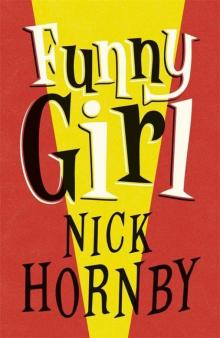 Funny Girl
Funny Girl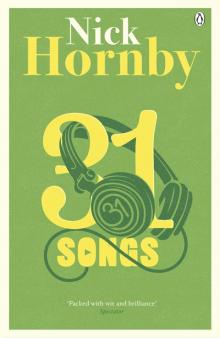 31 Songs
31 Songs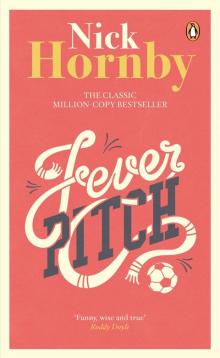 Fever Pitch
Fever Pitch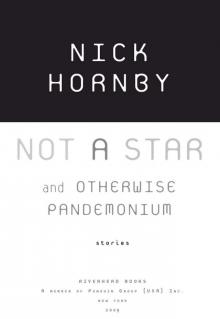 Not a Star and Otherwise Pandemonium
Not a Star and Otherwise Pandemonium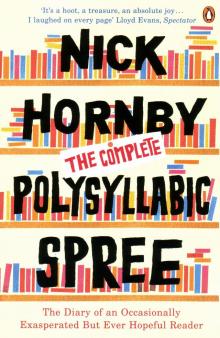 The Complete Polysyllabic Spree
The Complete Polysyllabic Spree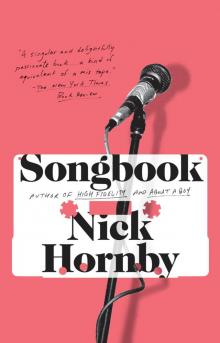 Songbook
Songbook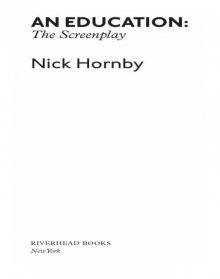 An Education
An Education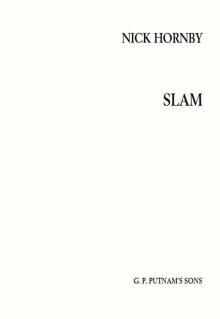 Slam
Slam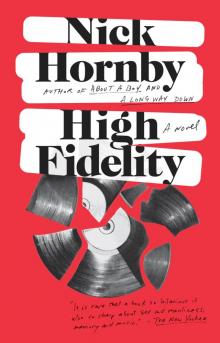 High Fidelity
High Fidelity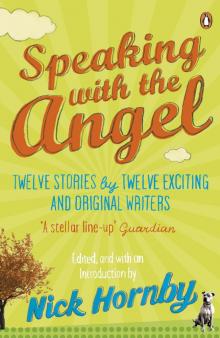 Speaking With the Angel
Speaking With the Angel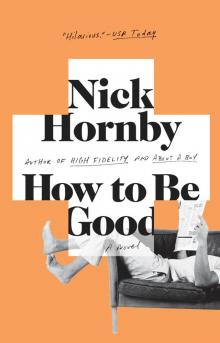 How to Be Good
How to Be Good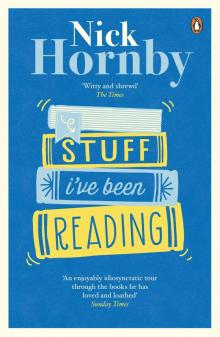 Stuff I've Been Reading
Stuff I've Been Reading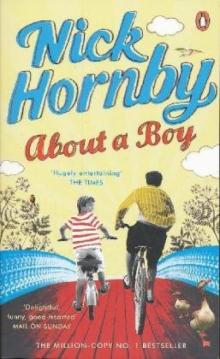 About a Boy
About a Boy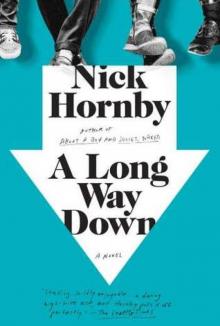 A Long Way Down
A Long Way Down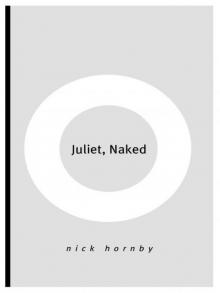 Juliet, Naked
Juliet, Naked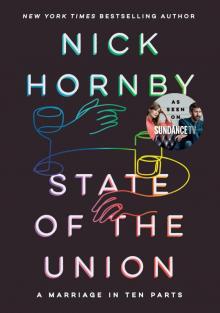 State of the Union
State of the Union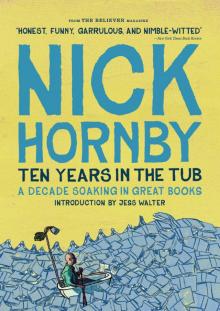 Ten Years in the Tub: A Decade Soaking in Great Books
Ten Years in the Tub: A Decade Soaking in Great Books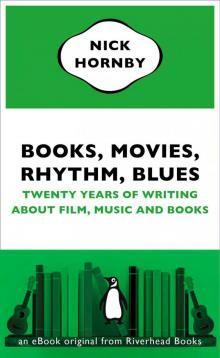 Books, Movies, Rhythm, Blues: Twenty Years of Writing About Film, Music and Books
Books, Movies, Rhythm, Blues: Twenty Years of Writing About Film, Music and Books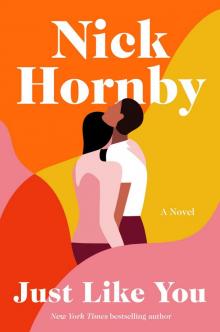 Just Like You
Just Like You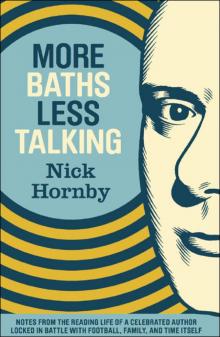 More Baths Less Talking
More Baths Less Talking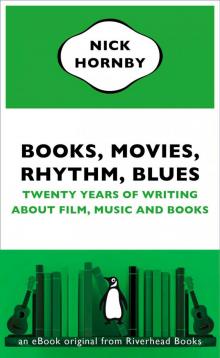 Books, Movies, Rhythm, Blues
Books, Movies, Rhythm, Blues